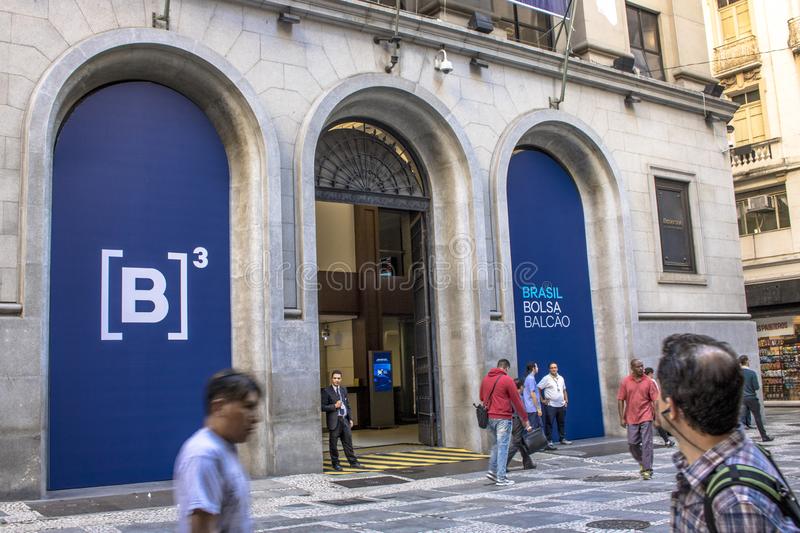RIO DE JANEIRO, BRAZIL – The IBOVESPA index closed high on Monday, May 25th, and bounced back to its highest level since March 10th, driven by investors’ optimism, excited about potential cures for the novel coronavirus, and cheered by the reopening of several economies.
This was coupled with relief from political tension amid opinions that the April 22nd cabinet meeting video was not as negative for President Jair Bolsonaro as investors had feared before its disclosure, which could heighten the climate of political instability.
There was activity by IBOVESPA to close the gap with the B3 future index, which climbed in the after-market last Friday, May 23rd because the Exchange was already closed when people watched the video featuring the President of the Republic.
The IBOVESPA closed up 4.25 percent to 85,663 points with a trading volume of R$20.769 billion. It was its highest closing since March 10th, when the benchmark closed the day at 92,214 points.

The dollar traded down 2.08 percent, at R$ 5.4555 in purchase and R$5.458 in sale. The future dollar for June was down 1.7 percent to R$5.446.
In the future interest rate market, the DI (interbank transactions) for January 2022 dropped 12 basis points to 3.20 percent, the DI for January 2023 dropped ten basis points to 4.31 percent, while the DI for January 2025 dropped ten basis points to 6.10 percent.
Yesterday, the German entrepreneur confidence index was also released, which rose from 74.2 points in April to 79.5 points in May, showing an improvement in the economic outlook for Europe’s largest economy. The US stock market was closed due to the Memorial Day holiday in the United States.
“The main focus will remain on the continued evidence that the number of new Covid-19 cases is decreasing in developed countries, on progress towards medical solutions, on reopening economies and on indications that economic activity is increasing,” said Shane Oliver, chief investment strategist at AMP Capital Investors, in an interview with Bloomberg.
In Brazil, financial market economists again revised their projections for the Gross Domestic Product (GDP) in 2020, down from a 5.12 percent contraction to an even higher 5.89 percent, according to the Central Bank’s Focus Report. For 2021, expectations for GDP were raised from 3.20 to 3.50 percent growth.
Projections for the Broad National Consumer Price Index (IPCA) fluctuated from 1.59 to 1.57 percent in 2020. For 2021, the estimate dropped from 3.20 to 3.14 percent.
As for the SELIC basic interest rate, projections were maintained at 2.25 percent for 2020 but were reduced from 3.50 to 3.29 percent in 2021.
The projection for the exchange rate rose from R$5.28 to R$5.40 for 2020 and from R$5.00 to R$5.03 for 2021.
Consumer confidence, measured by the Getúlio Vargas Foundation (FGV), was another indicator disclosed in Brazil, showing an increase of 3.9 points in May. Consequently, the index reached 62.1 points. It was the first high since the start of the pandemic.
Coronavirus consequences
The spread of the coronavirus in Brazil, which has become the new epicenter of the disease, is now causing negative repercussions.
On Sunday, the United States announced its decision to veto the entry into the country of non-residents who have passed through Brazil within the past 14 days. The goal is to stop the spread of the novel coronavirus.
Brazil is the second country behind the United States in terms of the number of cases. There are more than 360,000 people infected and 22,666 deaths.
Economic Indicators
In Brazil, the consumer confidence index was released during the morning of May 24th by the Getúlio Vargas Foundation (FGV); it rose 3.9 points in May compared to April in the seasonally adjusted series, to 62.1 points. The result should be interpreted as an accommodation, recovering only 13.2 percent of the 29.6-point drop accumulated in the previous two months, stressed the FGV.
The indicator should illustrate how the mood of Brazilians is being impacted by the current coronavirus pandemic and how this may affect retail prospects.
Corporate outlook
The spread of the novel coronavirus in Brazil and the social isolation measures implemented in several states show its impact on the economy. The main highways in the country continue to record a drop in traffic.
NovaDutra, the concession managing the Presidente Dutra toll road between Rio and São Paulo, recorded a 24.6 percent drop in traffic from May 15th to 21st compared to the same period last year. The highest drop occurred in the passenger vehicle segment. In the year-to-date, the decline is 12.2 percent.
The same effect was felt in the South Mato Grosso Highway, where traffic dropped by 7.5 percent between May 15th and 21st, compared to the same period last year. The decline was greater in the passenger vehicle segment. The year-to-date decline is 6.2 percent.
Major stock trading highs
| Asset | Variation % | Value (R$) |
|---|---|---|
| VVAR3 | 15.46392 | 11.2 |
| CVCB3 | 12.51002 | 14.03 |
| CYRE3 | 12.4328 | 16.73 |
| SBSP3 | 12.29341 | 49.6 |
| MRVE3 | 12.12324 | 16.74 |
Major stock trading declines
| Asset | Variation % | Value (R$) |
|---|---|---|
| MRFG3 | -2.61283 | 12.3 |
| SUZB3 | -1.6058 | 37.99 |
| BEEF3 | -1.16641 | 12.71 |
| KLBN11 | -1.14583 | 18.98 |
| BRAP4 | -0.37518 | 34.52 |
The CSN steel company announced on Friday, after the markets closed, that it had negotiated with the Bank of Brazil the deferral of a debt maturity of R$1.4 billion. The amount would mature between May this year and March 2021. The company has recorded a drop in demand for steel due to the coronavirus pandemic.
Equatorial Energia recorded a net profit of R$1.312 billion in Q4 2019, over three times the figure for the same period in 2018. The EBITDA (earnings before interest, taxes, depreciation, and amortization) rose almost 100 percent to R$2.367 billion.
Source: InfoMoney

